Contemporary Hospitality Industry: Scale, Scope and Diversity Report
VerifiedAdded on 2020/10/23
|10
|2794
|349
Report
AI Summary
This report provides a comprehensive analysis of the contemporary hospitality industry in the UK. It begins with an examination of the industry's scale, scope, and diversity, including its contribution to the UK economy and the various types of businesses within the sector. The report then delves into the organizational structures of different hospitality organizations, using the Intercontinental Hotels Group as a case study. It discusses the staffing requirements of different hospitality businesses, outlining the roles, responsibilities, and qualifications of hospitality staff. The report also assesses the roles of various hospitality-related organizations and professional bodies. The analysis includes discussion of the British Hospitality Association, British Institute of Inn-keeping and the Institute of hospitality. A PowerPoint presentation covers major trends and forecasts within the industry. The report concludes by highlighting the importance of the hospitality sector to the UK economy and the need for skilled staff to ensure its continued success.
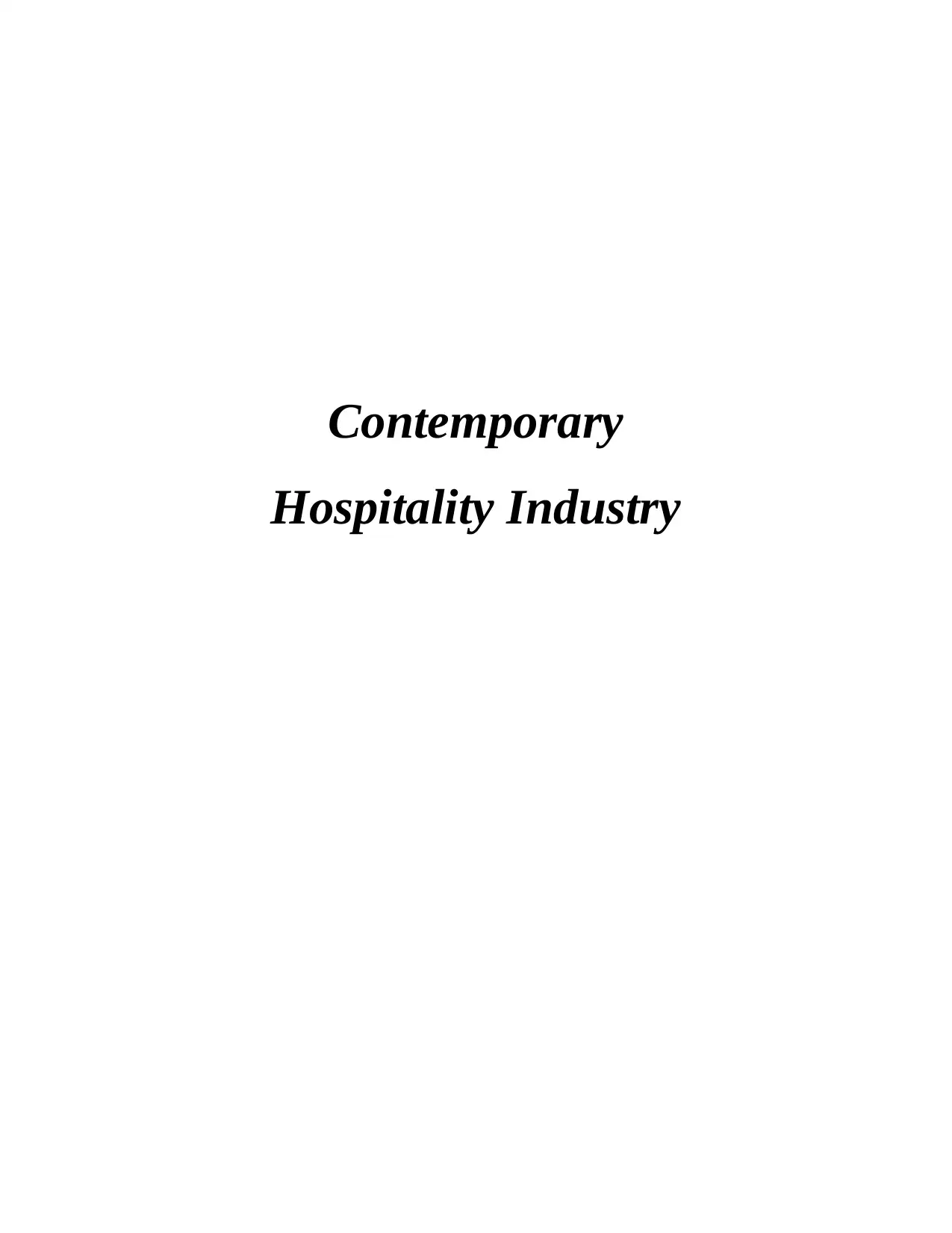
Contemporary
Hospitality Industry
Hospitality Industry
Paraphrase This Document
Need a fresh take? Get an instant paraphrase of this document with our AI Paraphraser
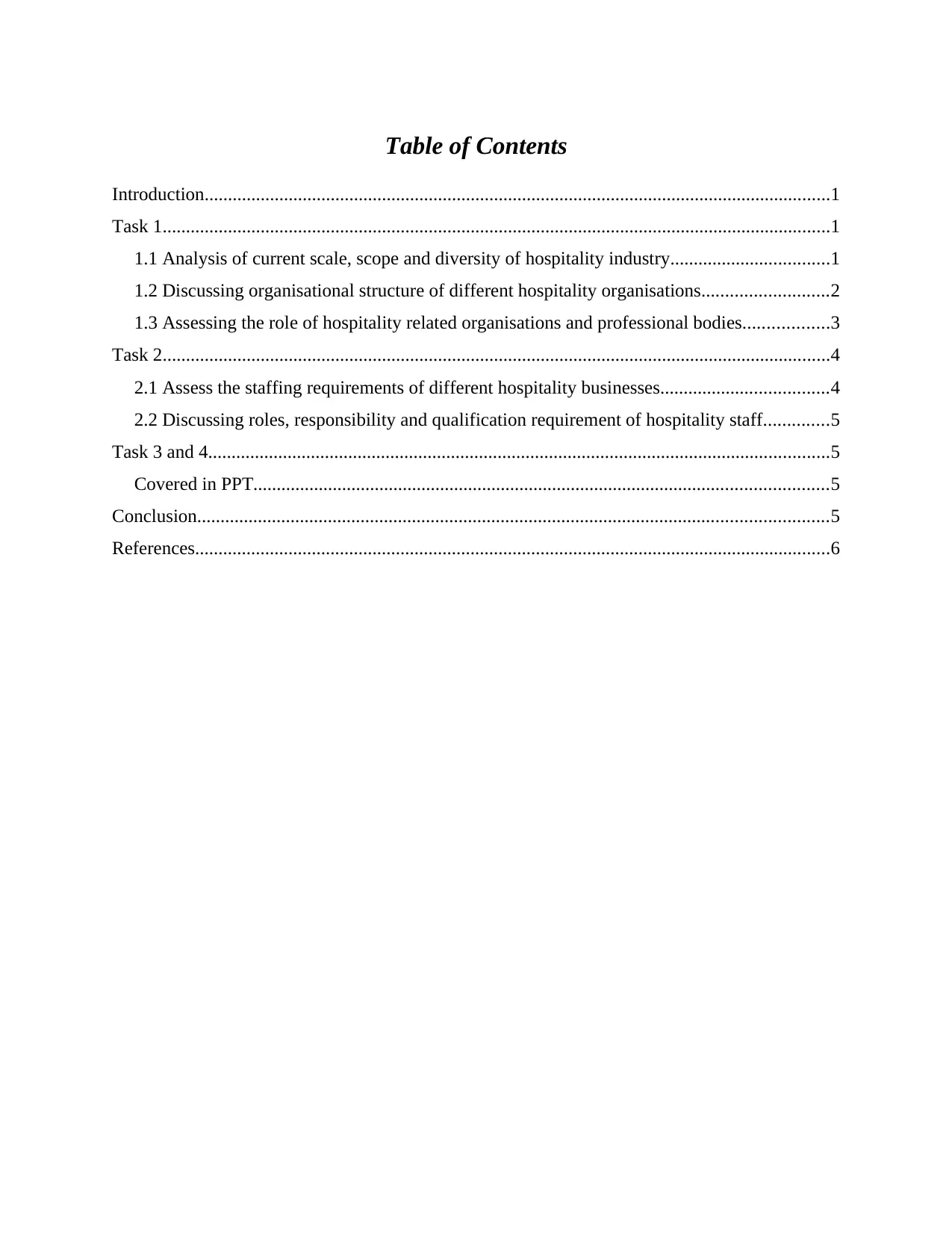
Table of Contents
Introduction......................................................................................................................................1
Task 1...............................................................................................................................................1
1.1 Analysis of current scale, scope and diversity of hospitality industry..................................1
1.2 Discussing organisational structure of different hospitality organisations...........................2
1.3 Assessing the role of hospitality related organisations and professional bodies..................3
Task 2...............................................................................................................................................4
2.1 Assess the staffing requirements of different hospitality businesses....................................4
2.2 Discussing roles, responsibility and qualification requirement of hospitality staff..............5
Task 3 and 4.....................................................................................................................................5
Covered in PPT...........................................................................................................................5
Conclusion.......................................................................................................................................5
References........................................................................................................................................6
Introduction......................................................................................................................................1
Task 1...............................................................................................................................................1
1.1 Analysis of current scale, scope and diversity of hospitality industry..................................1
1.2 Discussing organisational structure of different hospitality organisations...........................2
1.3 Assessing the role of hospitality related organisations and professional bodies..................3
Task 2...............................................................................................................................................4
2.1 Assess the staffing requirements of different hospitality businesses....................................4
2.2 Discussing roles, responsibility and qualification requirement of hospitality staff..............5
Task 3 and 4.....................................................................................................................................5
Covered in PPT...........................................................................................................................5
Conclusion.......................................................................................................................................5
References........................................................................................................................................6
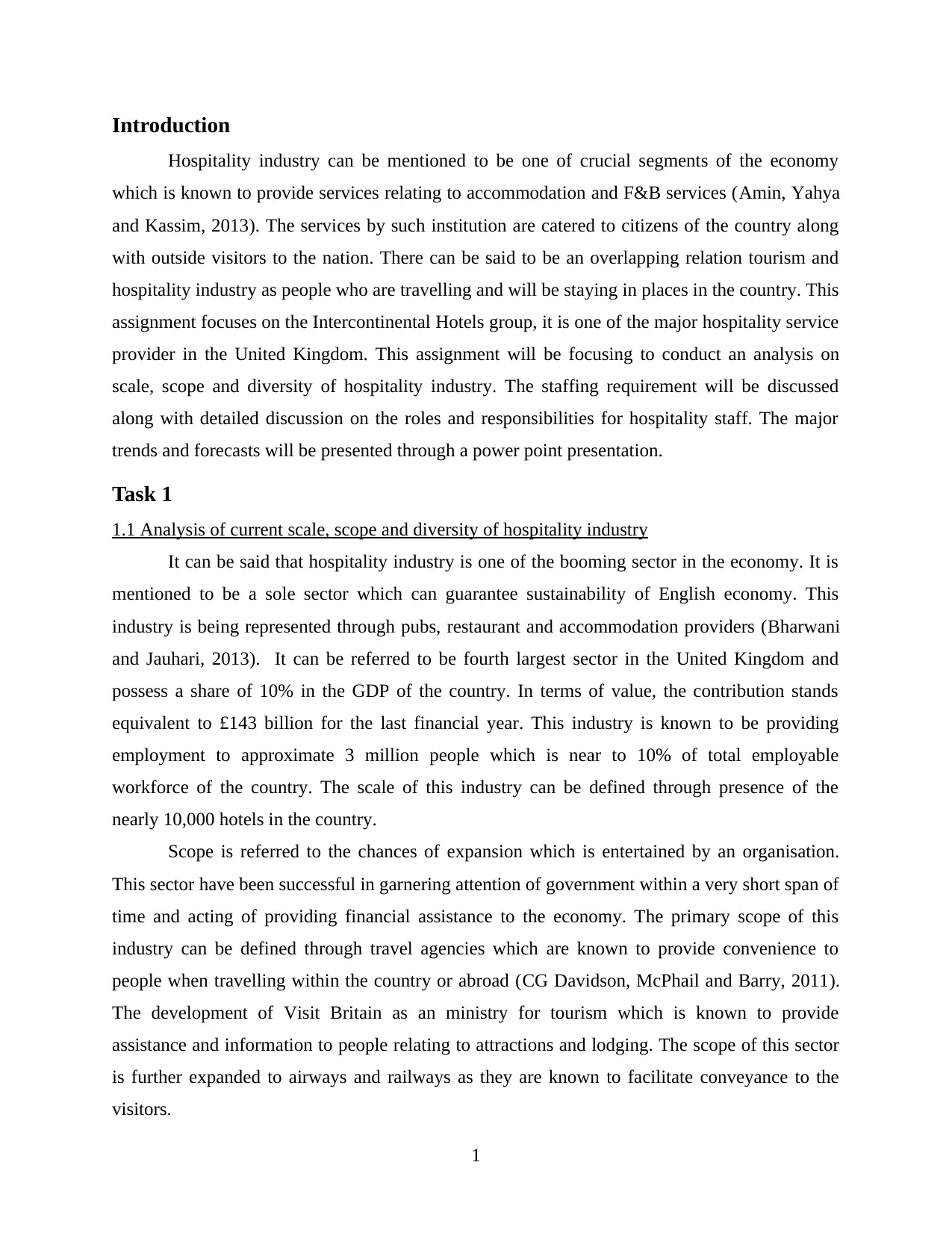
Introduction
Hospitality industry can be mentioned to be one of crucial segments of the economy
which is known to provide services relating to accommodation and F&B services (Amin, Yahya
and Kassim, 2013). The services by such institution are catered to citizens of the country along
with outside visitors to the nation. There can be said to be an overlapping relation tourism and
hospitality industry as people who are travelling and will be staying in places in the country. This
assignment focuses on the Intercontinental Hotels group, it is one of the major hospitality service
provider in the United Kingdom. This assignment will be focusing to conduct an analysis on
scale, scope and diversity of hospitality industry. The staffing requirement will be discussed
along with detailed discussion on the roles and responsibilities for hospitality staff. The major
trends and forecasts will be presented through a power point presentation.
Task 1
1.1 Analysis of current scale, scope and diversity of hospitality industry
It can be said that hospitality industry is one of the booming sector in the economy. It is
mentioned to be a sole sector which can guarantee sustainability of English economy. This
industry is being represented through pubs, restaurant and accommodation providers (Bharwani
and Jauhari, 2013). It can be referred to be fourth largest sector in the United Kingdom and
possess a share of 10% in the GDP of the country. In terms of value, the contribution stands
equivalent to £143 billion for the last financial year. This industry is known to be providing
employment to approximate 3 million people which is near to 10% of total employable
workforce of the country. The scale of this industry can be defined through presence of the
nearly 10,000 hotels in the country.
Scope is referred to the chances of expansion which is entertained by an organisation.
This sector have been successful in garnering attention of government within a very short span of
time and acting of providing financial assistance to the economy. The primary scope of this
industry can be defined through travel agencies which are known to provide convenience to
people when travelling within the country or abroad (CG Davidson, McPhail and Barry, 2011).
The development of Visit Britain as an ministry for tourism which is known to provide
assistance and information to people relating to attractions and lodging. The scope of this sector
is further expanded to airways and railways as they are known to facilitate conveyance to the
visitors.
1
Hospitality industry can be mentioned to be one of crucial segments of the economy
which is known to provide services relating to accommodation and F&B services (Amin, Yahya
and Kassim, 2013). The services by such institution are catered to citizens of the country along
with outside visitors to the nation. There can be said to be an overlapping relation tourism and
hospitality industry as people who are travelling and will be staying in places in the country. This
assignment focuses on the Intercontinental Hotels group, it is one of the major hospitality service
provider in the United Kingdom. This assignment will be focusing to conduct an analysis on
scale, scope and diversity of hospitality industry. The staffing requirement will be discussed
along with detailed discussion on the roles and responsibilities for hospitality staff. The major
trends and forecasts will be presented through a power point presentation.
Task 1
1.1 Analysis of current scale, scope and diversity of hospitality industry
It can be said that hospitality industry is one of the booming sector in the economy. It is
mentioned to be a sole sector which can guarantee sustainability of English economy. This
industry is being represented through pubs, restaurant and accommodation providers (Bharwani
and Jauhari, 2013). It can be referred to be fourth largest sector in the United Kingdom and
possess a share of 10% in the GDP of the country. In terms of value, the contribution stands
equivalent to £143 billion for the last financial year. This industry is known to be providing
employment to approximate 3 million people which is near to 10% of total employable
workforce of the country. The scale of this industry can be defined through presence of the
nearly 10,000 hotels in the country.
Scope is referred to the chances of expansion which is entertained by an organisation.
This sector have been successful in garnering attention of government within a very short span of
time and acting of providing financial assistance to the economy. The primary scope of this
industry can be defined through travel agencies which are known to provide convenience to
people when travelling within the country or abroad (CG Davidson, McPhail and Barry, 2011).
The development of Visit Britain as an ministry for tourism which is known to provide
assistance and information to people relating to attractions and lodging. The scope of this sector
is further expanded to airways and railways as they are known to facilitate conveyance to the
visitors.
1
⊘ This is a preview!⊘
Do you want full access?
Subscribe today to unlock all pages.

Trusted by 1+ million students worldwide
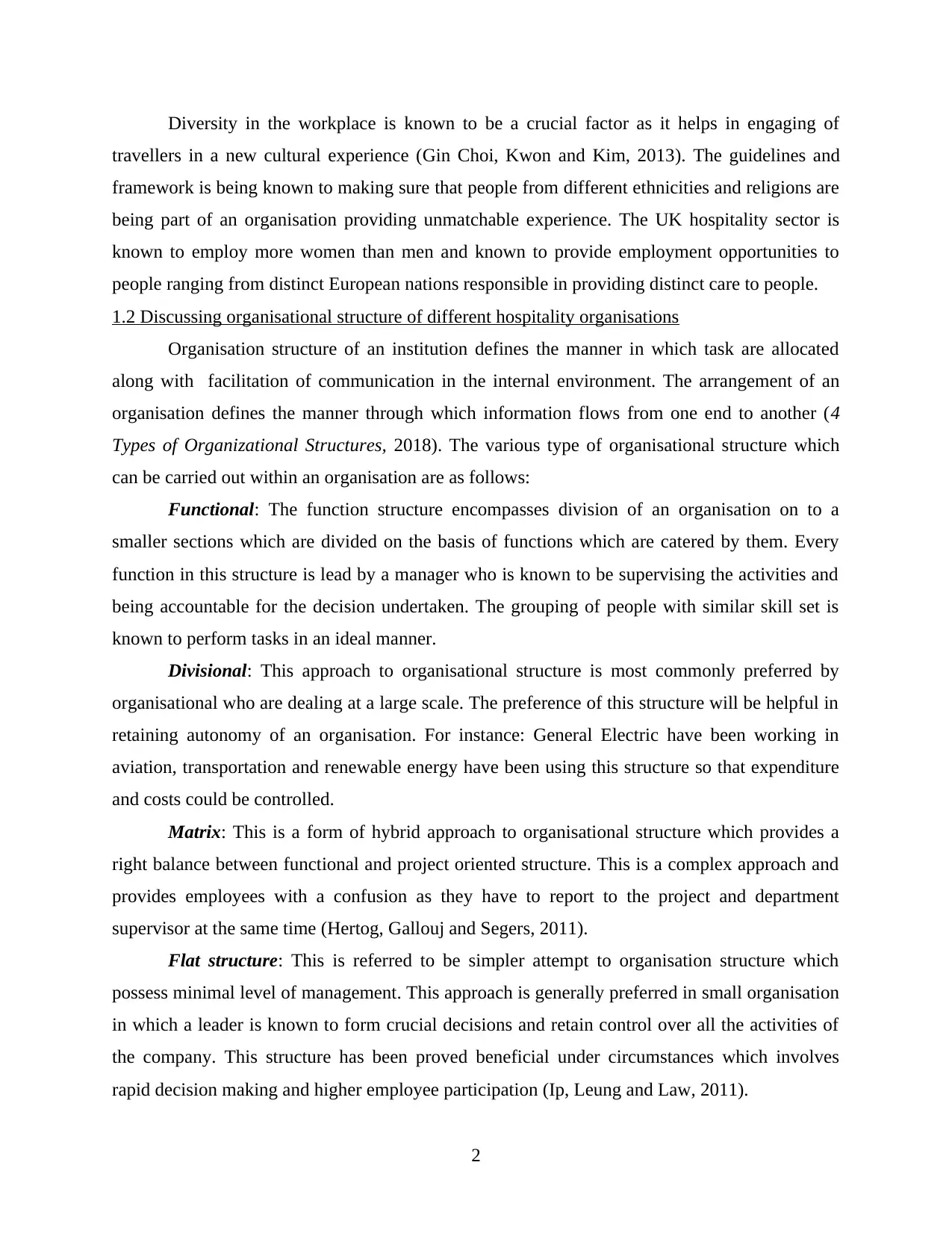
Diversity in the workplace is known to be a crucial factor as it helps in engaging of
travellers in a new cultural experience (Gin Choi, Kwon and Kim, 2013). The guidelines and
framework is being known to making sure that people from different ethnicities and religions are
being part of an organisation providing unmatchable experience. The UK hospitality sector is
known to employ more women than men and known to provide employment opportunities to
people ranging from distinct European nations responsible in providing distinct care to people.
1.2 Discussing organisational structure of different hospitality organisations
Organisation structure of an institution defines the manner in which task are allocated
along with facilitation of communication in the internal environment. The arrangement of an
organisation defines the manner through which information flows from one end to another (4
Types of Organizational Structures, 2018). The various type of organisational structure which
can be carried out within an organisation are as follows:
Functional: The function structure encompasses division of an organisation on to a
smaller sections which are divided on the basis of functions which are catered by them. Every
function in this structure is lead by a manager who is known to be supervising the activities and
being accountable for the decision undertaken. The grouping of people with similar skill set is
known to perform tasks in an ideal manner.
Divisional: This approach to organisational structure is most commonly preferred by
organisational who are dealing at a large scale. The preference of this structure will be helpful in
retaining autonomy of an organisation. For instance: General Electric have been working in
aviation, transportation and renewable energy have been using this structure so that expenditure
and costs could be controlled.
Matrix: This is a form of hybrid approach to organisational structure which provides a
right balance between functional and project oriented structure. This is a complex approach and
provides employees with a confusion as they have to report to the project and department
supervisor at the same time (Hertog, Gallouj and Segers, 2011).
Flat structure: This is referred to be simpler attempt to organisation structure which
possess minimal level of management. This approach is generally preferred in small organisation
in which a leader is known to form crucial decisions and retain control over all the activities of
the company. This structure has been proved beneficial under circumstances which involves
rapid decision making and higher employee participation (Ip, Leung and Law, 2011).
2
travellers in a new cultural experience (Gin Choi, Kwon and Kim, 2013). The guidelines and
framework is being known to making sure that people from different ethnicities and religions are
being part of an organisation providing unmatchable experience. The UK hospitality sector is
known to employ more women than men and known to provide employment opportunities to
people ranging from distinct European nations responsible in providing distinct care to people.
1.2 Discussing organisational structure of different hospitality organisations
Organisation structure of an institution defines the manner in which task are allocated
along with facilitation of communication in the internal environment. The arrangement of an
organisation defines the manner through which information flows from one end to another (4
Types of Organizational Structures, 2018). The various type of organisational structure which
can be carried out within an organisation are as follows:
Functional: The function structure encompasses division of an organisation on to a
smaller sections which are divided on the basis of functions which are catered by them. Every
function in this structure is lead by a manager who is known to be supervising the activities and
being accountable for the decision undertaken. The grouping of people with similar skill set is
known to perform tasks in an ideal manner.
Divisional: This approach to organisational structure is most commonly preferred by
organisational who are dealing at a large scale. The preference of this structure will be helpful in
retaining autonomy of an organisation. For instance: General Electric have been working in
aviation, transportation and renewable energy have been using this structure so that expenditure
and costs could be controlled.
Matrix: This is a form of hybrid approach to organisational structure which provides a
right balance between functional and project oriented structure. This is a complex approach and
provides employees with a confusion as they have to report to the project and department
supervisor at the same time (Hertog, Gallouj and Segers, 2011).
Flat structure: This is referred to be simpler attempt to organisation structure which
possess minimal level of management. This approach is generally preferred in small organisation
in which a leader is known to form crucial decisions and retain control over all the activities of
the company. This structure has been proved beneficial under circumstances which involves
rapid decision making and higher employee participation (Ip, Leung and Law, 2011).
2
Paraphrase This Document
Need a fresh take? Get an instant paraphrase of this document with our AI Paraphraser
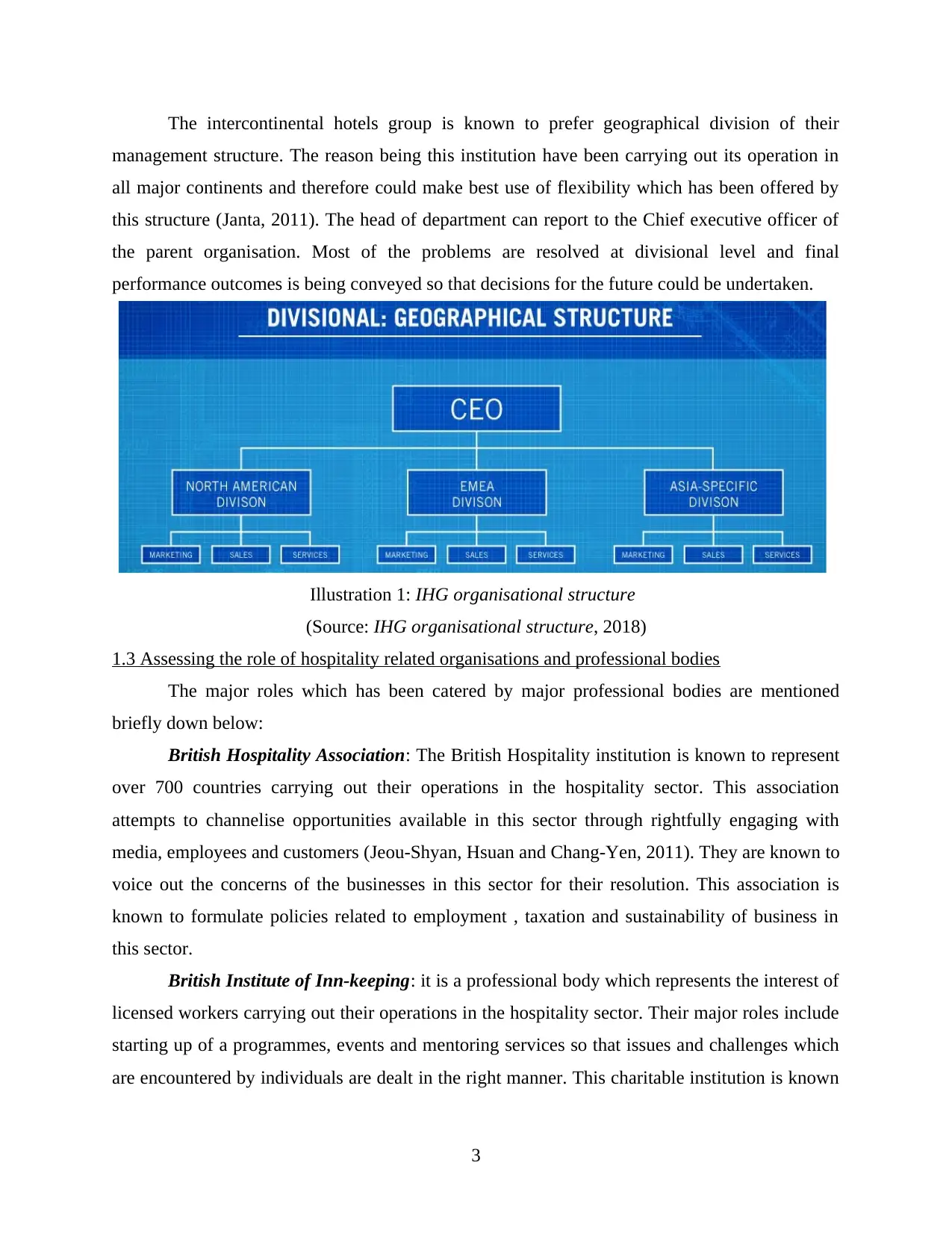
The intercontinental hotels group is known to prefer geographical division of their
management structure. The reason being this institution have been carrying out its operation in
all major continents and therefore could make best use of flexibility which has been offered by
this structure (Janta, 2011). The head of department can report to the Chief executive officer of
the parent organisation. Most of the problems are resolved at divisional level and final
performance outcomes is being conveyed so that decisions for the future could be undertaken.
(Source: IHG organisational structure, 2018)
1.3 Assessing the role of hospitality related organisations and professional bodies
The major roles which has been catered by major professional bodies are mentioned
briefly down below:
British Hospitality Association: The British Hospitality institution is known to represent
over 700 countries carrying out their operations in the hospitality sector. This association
attempts to channelise opportunities available in this sector through rightfully engaging with
media, employees and customers (Jeou-Shyan, Hsuan and Chang-Yen, 2011). They are known to
voice out the concerns of the businesses in this sector for their resolution. This association is
known to formulate policies related to employment , taxation and sustainability of business in
this sector.
British Institute of Inn-keeping: it is a professional body which represents the interest of
licensed workers carrying out their operations in the hospitality sector. Their major roles include
starting up of a programmes, events and mentoring services so that issues and challenges which
are encountered by individuals are dealt in the right manner. This charitable institution is known
3
Illustration 1: IHG organisational structure
management structure. The reason being this institution have been carrying out its operation in
all major continents and therefore could make best use of flexibility which has been offered by
this structure (Janta, 2011). The head of department can report to the Chief executive officer of
the parent organisation. Most of the problems are resolved at divisional level and final
performance outcomes is being conveyed so that decisions for the future could be undertaken.
(Source: IHG organisational structure, 2018)
1.3 Assessing the role of hospitality related organisations and professional bodies
The major roles which has been catered by major professional bodies are mentioned
briefly down below:
British Hospitality Association: The British Hospitality institution is known to represent
over 700 countries carrying out their operations in the hospitality sector. This association
attempts to channelise opportunities available in this sector through rightfully engaging with
media, employees and customers (Jeou-Shyan, Hsuan and Chang-Yen, 2011). They are known to
voice out the concerns of the businesses in this sector for their resolution. This association is
known to formulate policies related to employment , taxation and sustainability of business in
this sector.
British Institute of Inn-keeping: it is a professional body which represents the interest of
licensed workers carrying out their operations in the hospitality sector. Their major roles include
starting up of a programmes, events and mentoring services so that issues and challenges which
are encountered by individuals are dealt in the right manner. This charitable institution is known
3
Illustration 1: IHG organisational structure
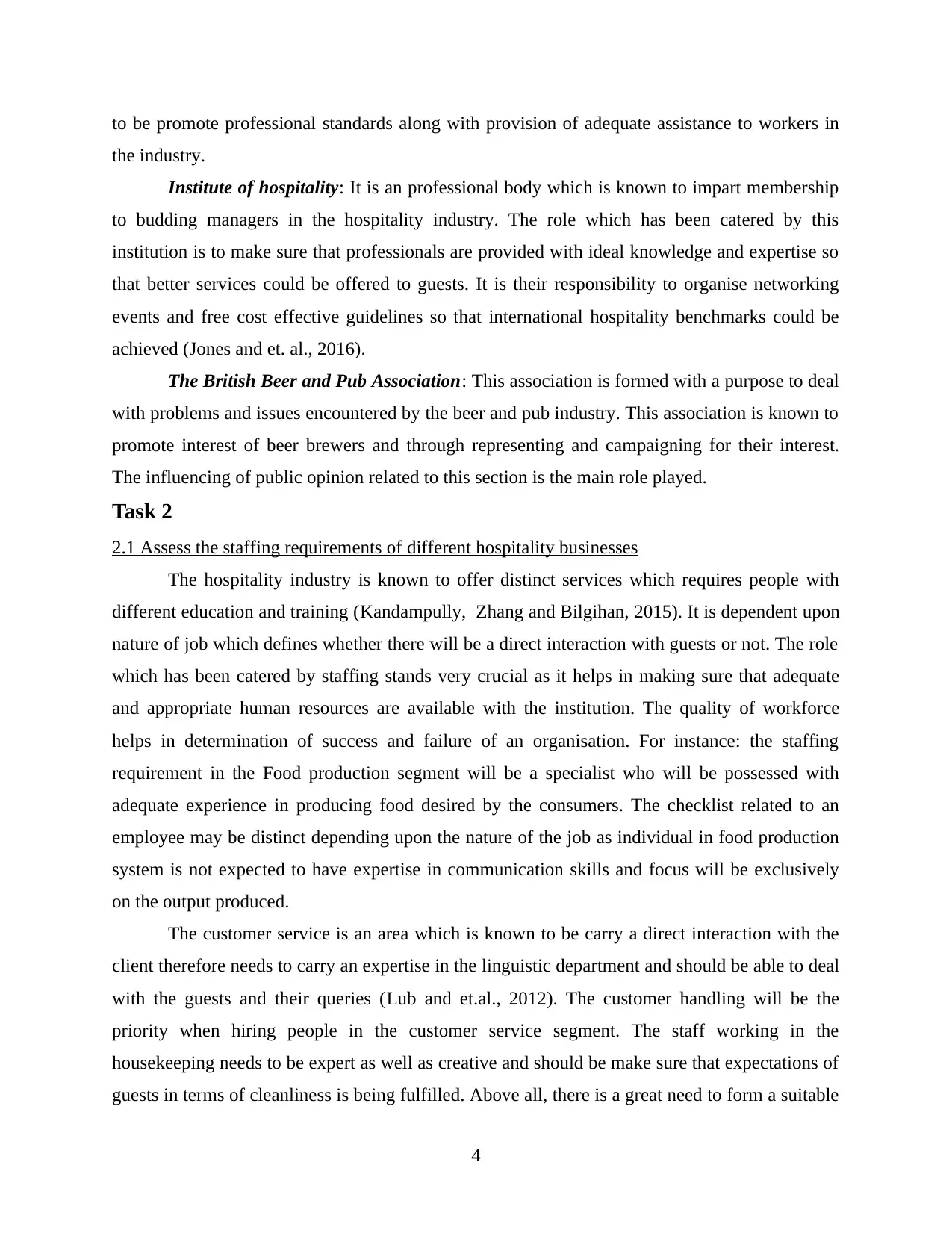
to be promote professional standards along with provision of adequate assistance to workers in
the industry.
Institute of hospitality: It is an professional body which is known to impart membership
to budding managers in the hospitality industry. The role which has been catered by this
institution is to make sure that professionals are provided with ideal knowledge and expertise so
that better services could be offered to guests. It is their responsibility to organise networking
events and free cost effective guidelines so that international hospitality benchmarks could be
achieved (Jones and et. al., 2016).
The British Beer and Pub Association: This association is formed with a purpose to deal
with problems and issues encountered by the beer and pub industry. This association is known to
promote interest of beer brewers and through representing and campaigning for their interest.
The influencing of public opinion related to this section is the main role played.
Task 2
2.1 Assess the staffing requirements of different hospitality businesses
The hospitality industry is known to offer distinct services which requires people with
different education and training (Kandampully, Zhang and Bilgihan, 2015). It is dependent upon
nature of job which defines whether there will be a direct interaction with guests or not. The role
which has been catered by staffing stands very crucial as it helps in making sure that adequate
and appropriate human resources are available with the institution. The quality of workforce
helps in determination of success and failure of an organisation. For instance: the staffing
requirement in the Food production segment will be a specialist who will be possessed with
adequate experience in producing food desired by the consumers. The checklist related to an
employee may be distinct depending upon the nature of the job as individual in food production
system is not expected to have expertise in communication skills and focus will be exclusively
on the output produced.
The customer service is an area which is known to be carry a direct interaction with the
client therefore needs to carry an expertise in the linguistic department and should be able to deal
with the guests and their queries (Lub and et.al., 2012). The customer handling will be the
priority when hiring people in the customer service segment. The staff working in the
housekeeping needs to be expert as well as creative and should be make sure that expectations of
guests in terms of cleanliness is being fulfilled. Above all, there is a great need to form a suitable
4
the industry.
Institute of hospitality: It is an professional body which is known to impart membership
to budding managers in the hospitality industry. The role which has been catered by this
institution is to make sure that professionals are provided with ideal knowledge and expertise so
that better services could be offered to guests. It is their responsibility to organise networking
events and free cost effective guidelines so that international hospitality benchmarks could be
achieved (Jones and et. al., 2016).
The British Beer and Pub Association: This association is formed with a purpose to deal
with problems and issues encountered by the beer and pub industry. This association is known to
promote interest of beer brewers and through representing and campaigning for their interest.
The influencing of public opinion related to this section is the main role played.
Task 2
2.1 Assess the staffing requirements of different hospitality businesses
The hospitality industry is known to offer distinct services which requires people with
different education and training (Kandampully, Zhang and Bilgihan, 2015). It is dependent upon
nature of job which defines whether there will be a direct interaction with guests or not. The role
which has been catered by staffing stands very crucial as it helps in making sure that adequate
and appropriate human resources are available with the institution. The quality of workforce
helps in determination of success and failure of an organisation. For instance: the staffing
requirement in the Food production segment will be a specialist who will be possessed with
adequate experience in producing food desired by the consumers. The checklist related to an
employee may be distinct depending upon the nature of the job as individual in food production
system is not expected to have expertise in communication skills and focus will be exclusively
on the output produced.
The customer service is an area which is known to be carry a direct interaction with the
client therefore needs to carry an expertise in the linguistic department and should be able to deal
with the guests and their queries (Lub and et.al., 2012). The customer handling will be the
priority when hiring people in the customer service segment. The staff working in the
housekeeping needs to be expert as well as creative and should be make sure that expectations of
guests in terms of cleanliness is being fulfilled. Above all, there is a great need to form a suitable
4
⊘ This is a preview!⊘
Do you want full access?
Subscribe today to unlock all pages.

Trusted by 1+ million students worldwide
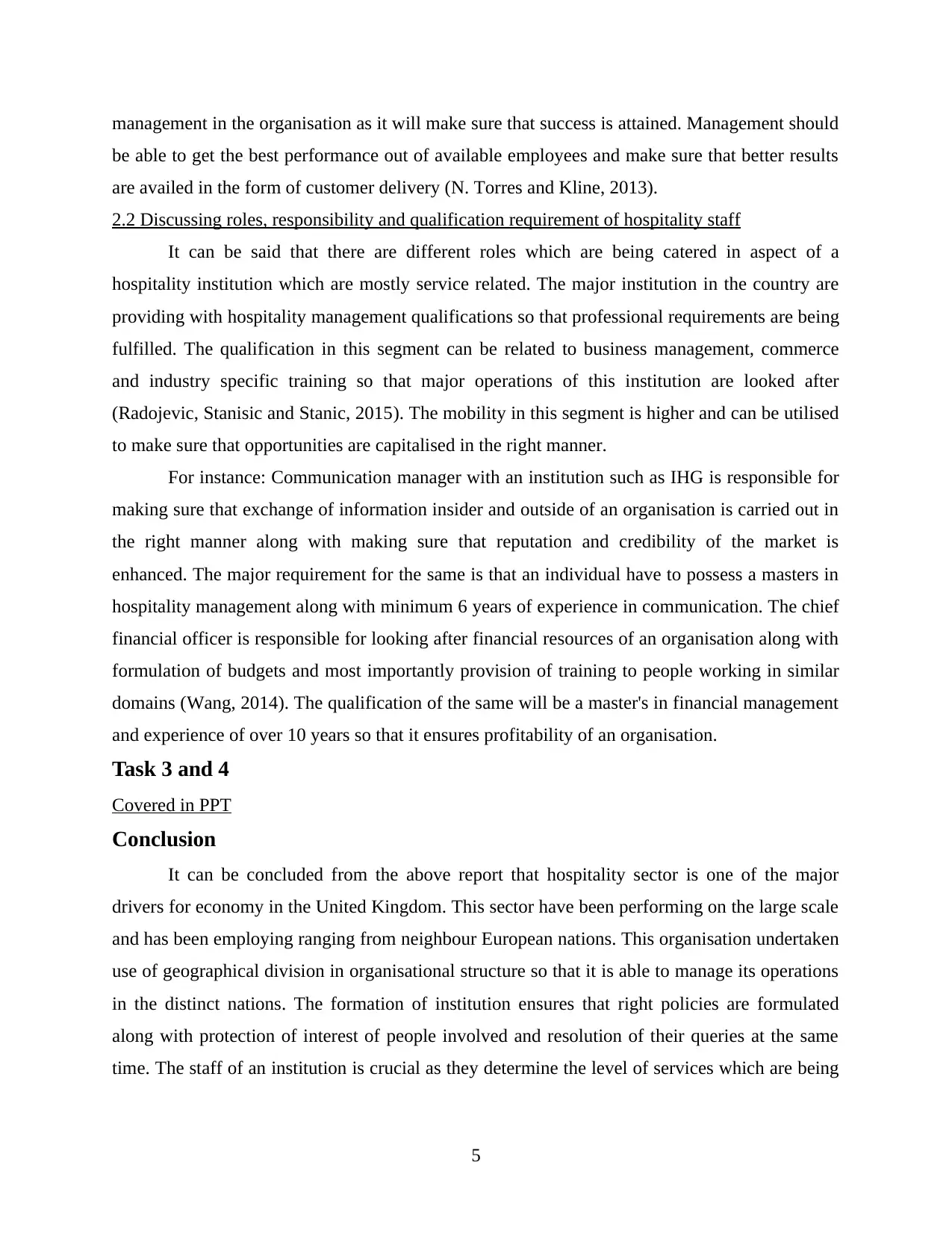
management in the organisation as it will make sure that success is attained. Management should
be able to get the best performance out of available employees and make sure that better results
are availed in the form of customer delivery (N. Torres and Kline, 2013).
2.2 Discussing roles, responsibility and qualification requirement of hospitality staff
It can be said that there are different roles which are being catered in aspect of a
hospitality institution which are mostly service related. The major institution in the country are
providing with hospitality management qualifications so that professional requirements are being
fulfilled. The qualification in this segment can be related to business management, commerce
and industry specific training so that major operations of this institution are looked after
(Radojevic, Stanisic and Stanic, 2015). The mobility in this segment is higher and can be utilised
to make sure that opportunities are capitalised in the right manner.
For instance: Communication manager with an institution such as IHG is responsible for
making sure that exchange of information insider and outside of an organisation is carried out in
the right manner along with making sure that reputation and credibility of the market is
enhanced. The major requirement for the same is that an individual have to possess a masters in
hospitality management along with minimum 6 years of experience in communication. The chief
financial officer is responsible for looking after financial resources of an organisation along with
formulation of budgets and most importantly provision of training to people working in similar
domains (Wang, 2014). The qualification of the same will be a master's in financial management
and experience of over 10 years so that it ensures profitability of an organisation.
Task 3 and 4
Covered in PPT
Conclusion
It can be concluded from the above report that hospitality sector is one of the major
drivers for economy in the United Kingdom. This sector have been performing on the large scale
and has been employing ranging from neighbour European nations. This organisation undertaken
use of geographical division in organisational structure so that it is able to manage its operations
in the distinct nations. The formation of institution ensures that right policies are formulated
along with protection of interest of people involved and resolution of their queries at the same
time. The staff of an institution is crucial as they determine the level of services which are being
5
be able to get the best performance out of available employees and make sure that better results
are availed in the form of customer delivery (N. Torres and Kline, 2013).
2.2 Discussing roles, responsibility and qualification requirement of hospitality staff
It can be said that there are different roles which are being catered in aspect of a
hospitality institution which are mostly service related. The major institution in the country are
providing with hospitality management qualifications so that professional requirements are being
fulfilled. The qualification in this segment can be related to business management, commerce
and industry specific training so that major operations of this institution are looked after
(Radojevic, Stanisic and Stanic, 2015). The mobility in this segment is higher and can be utilised
to make sure that opportunities are capitalised in the right manner.
For instance: Communication manager with an institution such as IHG is responsible for
making sure that exchange of information insider and outside of an organisation is carried out in
the right manner along with making sure that reputation and credibility of the market is
enhanced. The major requirement for the same is that an individual have to possess a masters in
hospitality management along with minimum 6 years of experience in communication. The chief
financial officer is responsible for looking after financial resources of an organisation along with
formulation of budgets and most importantly provision of training to people working in similar
domains (Wang, 2014). The qualification of the same will be a master's in financial management
and experience of over 10 years so that it ensures profitability of an organisation.
Task 3 and 4
Covered in PPT
Conclusion
It can be concluded from the above report that hospitality sector is one of the major
drivers for economy in the United Kingdom. This sector have been performing on the large scale
and has been employing ranging from neighbour European nations. This organisation undertaken
use of geographical division in organisational structure so that it is able to manage its operations
in the distinct nations. The formation of institution ensures that right policies are formulated
along with protection of interest of people involved and resolution of their queries at the same
time. The staff of an institution is crucial as they determine the level of services which are being
5
Paraphrase This Document
Need a fresh take? Get an instant paraphrase of this document with our AI Paraphraser
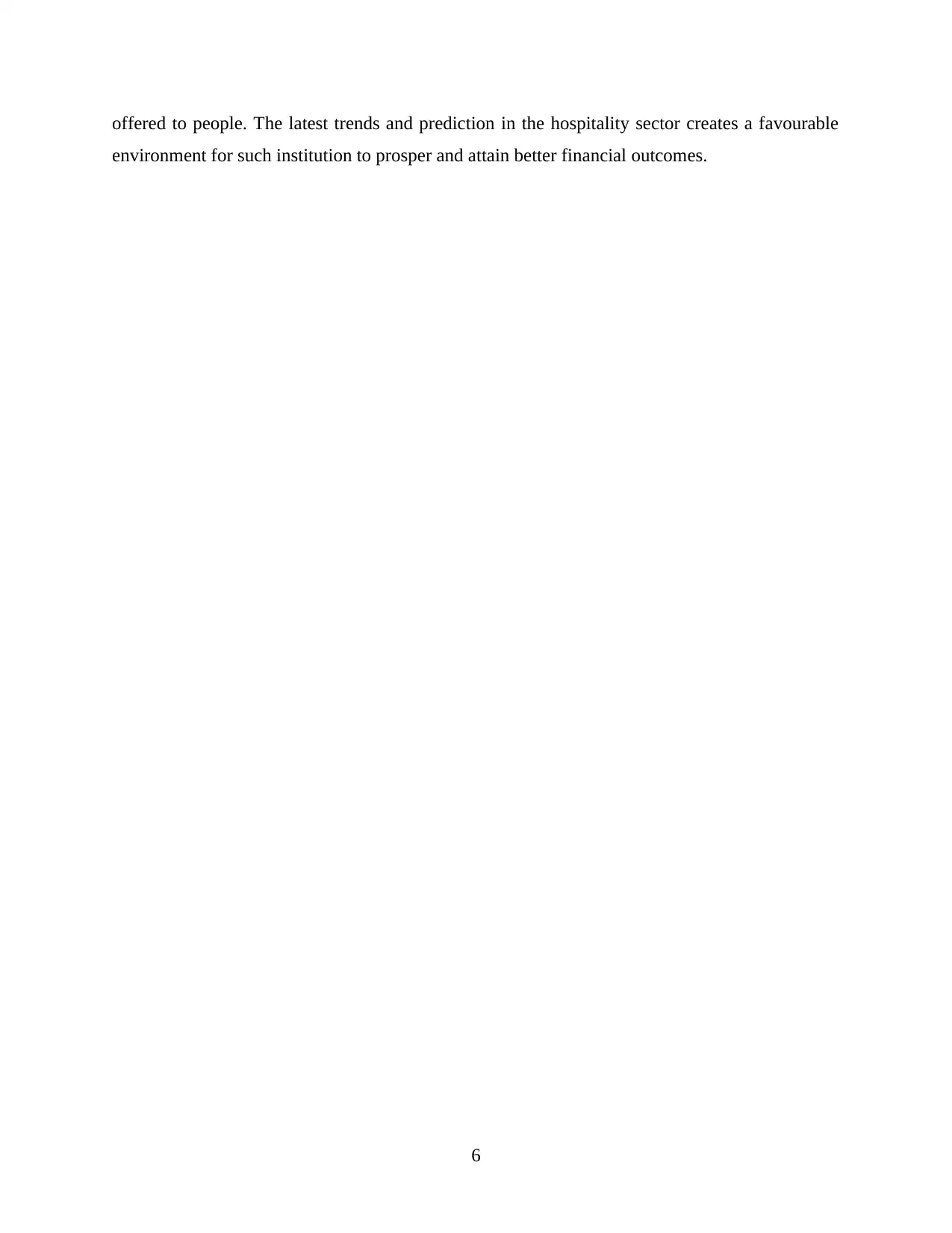
offered to people. The latest trends and prediction in the hospitality sector creates a favourable
environment for such institution to prosper and attain better financial outcomes.
6
environment for such institution to prosper and attain better financial outcomes.
6
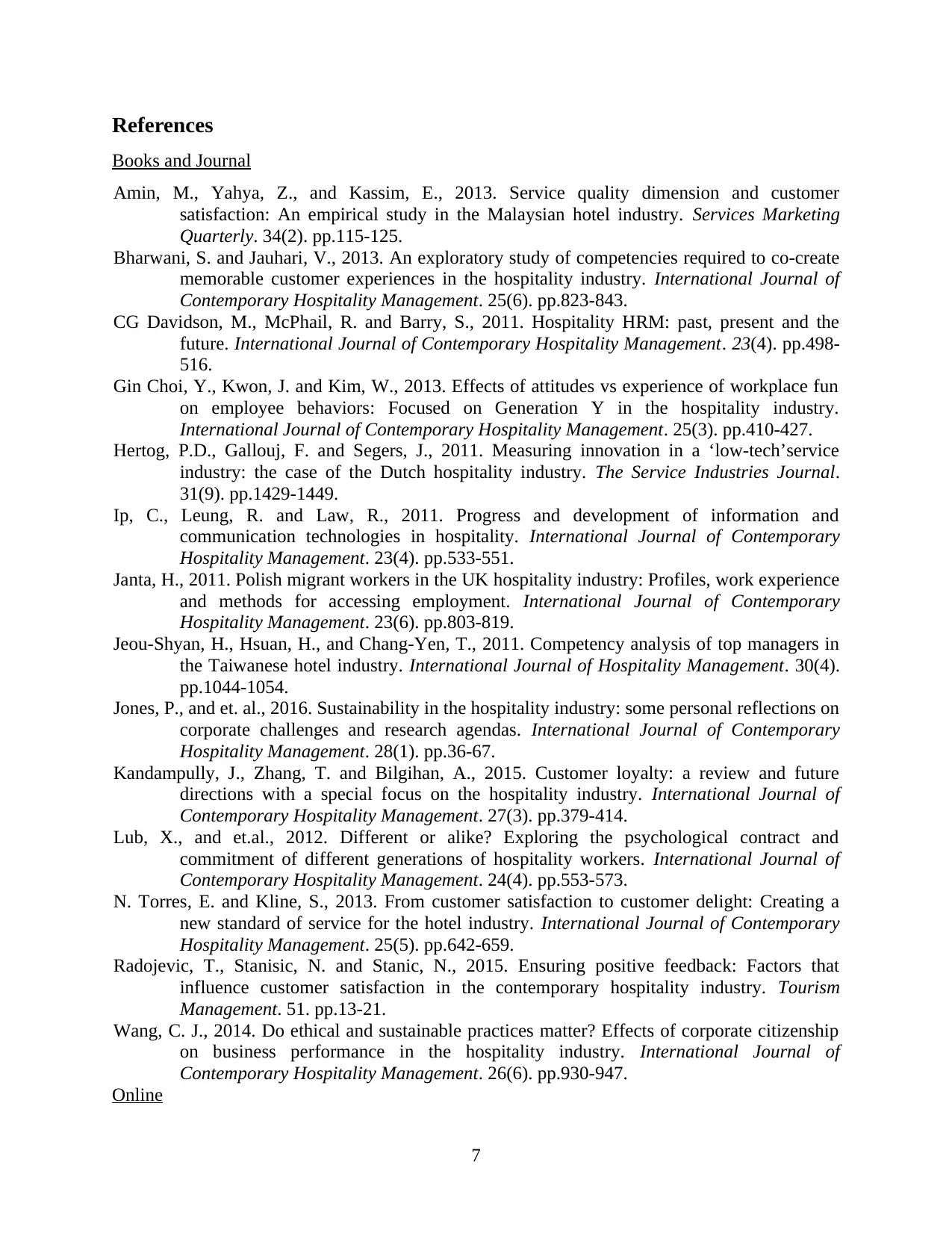
References
Books and Journal
Amin, M., Yahya, Z., and Kassim, E., 2013. Service quality dimension and customer
satisfaction: An empirical study in the Malaysian hotel industry. Services Marketing
Quarterly. 34(2). pp.115-125.
Bharwani, S. and Jauhari, V., 2013. An exploratory study of competencies required to co-create
memorable customer experiences in the hospitality industry. International Journal of
Contemporary Hospitality Management. 25(6). pp.823-843.
CG Davidson, M., McPhail, R. and Barry, S., 2011. Hospitality HRM: past, present and the
future. International Journal of Contemporary Hospitality Management. 23(4). pp.498-
516.
Gin Choi, Y., Kwon, J. and Kim, W., 2013. Effects of attitudes vs experience of workplace fun
on employee behaviors: Focused on Generation Y in the hospitality industry.
International Journal of Contemporary Hospitality Management. 25(3). pp.410-427.
Hertog, P.D., Gallouj, F. and Segers, J., 2011. Measuring innovation in a ‘low-tech’service
industry: the case of the Dutch hospitality industry. The Service Industries Journal.
31(9). pp.1429-1449.
Ip, C., Leung, R. and Law, R., 2011. Progress and development of information and
communication technologies in hospitality. International Journal of Contemporary
Hospitality Management. 23(4). pp.533-551.
Janta, H., 2011. Polish migrant workers in the UK hospitality industry: Profiles, work experience
and methods for accessing employment. International Journal of Contemporary
Hospitality Management. 23(6). pp.803-819.
Jeou-Shyan, H., Hsuan, H., and Chang-Yen, T., 2011. Competency analysis of top managers in
the Taiwanese hotel industry. International Journal of Hospitality Management. 30(4).
pp.1044-1054.
Jones, P., and et. al., 2016. Sustainability in the hospitality industry: some personal reflections on
corporate challenges and research agendas. International Journal of Contemporary
Hospitality Management. 28(1). pp.36-67.
Kandampully, J., Zhang, T. and Bilgihan, A., 2015. Customer loyalty: a review and future
directions with a special focus on the hospitality industry. International Journal of
Contemporary Hospitality Management. 27(3). pp.379-414.
Lub, X., and et.al., 2012. Different or alike? Exploring the psychological contract and
commitment of different generations of hospitality workers. International Journal of
Contemporary Hospitality Management. 24(4). pp.553-573.
N. Torres, E. and Kline, S., 2013. From customer satisfaction to customer delight: Creating a
new standard of service for the hotel industry. International Journal of Contemporary
Hospitality Management. 25(5). pp.642-659.
Radojevic, T., Stanisic, N. and Stanic, N., 2015. Ensuring positive feedback: Factors that
influence customer satisfaction in the contemporary hospitality industry. Tourism
Management. 51. pp.13-21.
Wang, C. J., 2014. Do ethical and sustainable practices matter? Effects of corporate citizenship
on business performance in the hospitality industry. International Journal of
Contemporary Hospitality Management. 26(6). pp.930-947.
Online
7
Books and Journal
Amin, M., Yahya, Z., and Kassim, E., 2013. Service quality dimension and customer
satisfaction: An empirical study in the Malaysian hotel industry. Services Marketing
Quarterly. 34(2). pp.115-125.
Bharwani, S. and Jauhari, V., 2013. An exploratory study of competencies required to co-create
memorable customer experiences in the hospitality industry. International Journal of
Contemporary Hospitality Management. 25(6). pp.823-843.
CG Davidson, M., McPhail, R. and Barry, S., 2011. Hospitality HRM: past, present and the
future. International Journal of Contemporary Hospitality Management. 23(4). pp.498-
516.
Gin Choi, Y., Kwon, J. and Kim, W., 2013. Effects of attitudes vs experience of workplace fun
on employee behaviors: Focused on Generation Y in the hospitality industry.
International Journal of Contemporary Hospitality Management. 25(3). pp.410-427.
Hertog, P.D., Gallouj, F. and Segers, J., 2011. Measuring innovation in a ‘low-tech’service
industry: the case of the Dutch hospitality industry. The Service Industries Journal.
31(9). pp.1429-1449.
Ip, C., Leung, R. and Law, R., 2011. Progress and development of information and
communication technologies in hospitality. International Journal of Contemporary
Hospitality Management. 23(4). pp.533-551.
Janta, H., 2011. Polish migrant workers in the UK hospitality industry: Profiles, work experience
and methods for accessing employment. International Journal of Contemporary
Hospitality Management. 23(6). pp.803-819.
Jeou-Shyan, H., Hsuan, H., and Chang-Yen, T., 2011. Competency analysis of top managers in
the Taiwanese hotel industry. International Journal of Hospitality Management. 30(4).
pp.1044-1054.
Jones, P., and et. al., 2016. Sustainability in the hospitality industry: some personal reflections on
corporate challenges and research agendas. International Journal of Contemporary
Hospitality Management. 28(1). pp.36-67.
Kandampully, J., Zhang, T. and Bilgihan, A., 2015. Customer loyalty: a review and future
directions with a special focus on the hospitality industry. International Journal of
Contemporary Hospitality Management. 27(3). pp.379-414.
Lub, X., and et.al., 2012. Different or alike? Exploring the psychological contract and
commitment of different generations of hospitality workers. International Journal of
Contemporary Hospitality Management. 24(4). pp.553-573.
N. Torres, E. and Kline, S., 2013. From customer satisfaction to customer delight: Creating a
new standard of service for the hotel industry. International Journal of Contemporary
Hospitality Management. 25(5). pp.642-659.
Radojevic, T., Stanisic, N. and Stanic, N., 2015. Ensuring positive feedback: Factors that
influence customer satisfaction in the contemporary hospitality industry. Tourism
Management. 51. pp.13-21.
Wang, C. J., 2014. Do ethical and sustainable practices matter? Effects of corporate citizenship
on business performance in the hospitality industry. International Journal of
Contemporary Hospitality Management. 26(6). pp.930-947.
Online
7
⊘ This is a preview!⊘
Do you want full access?
Subscribe today to unlock all pages.

Trusted by 1+ million students worldwide
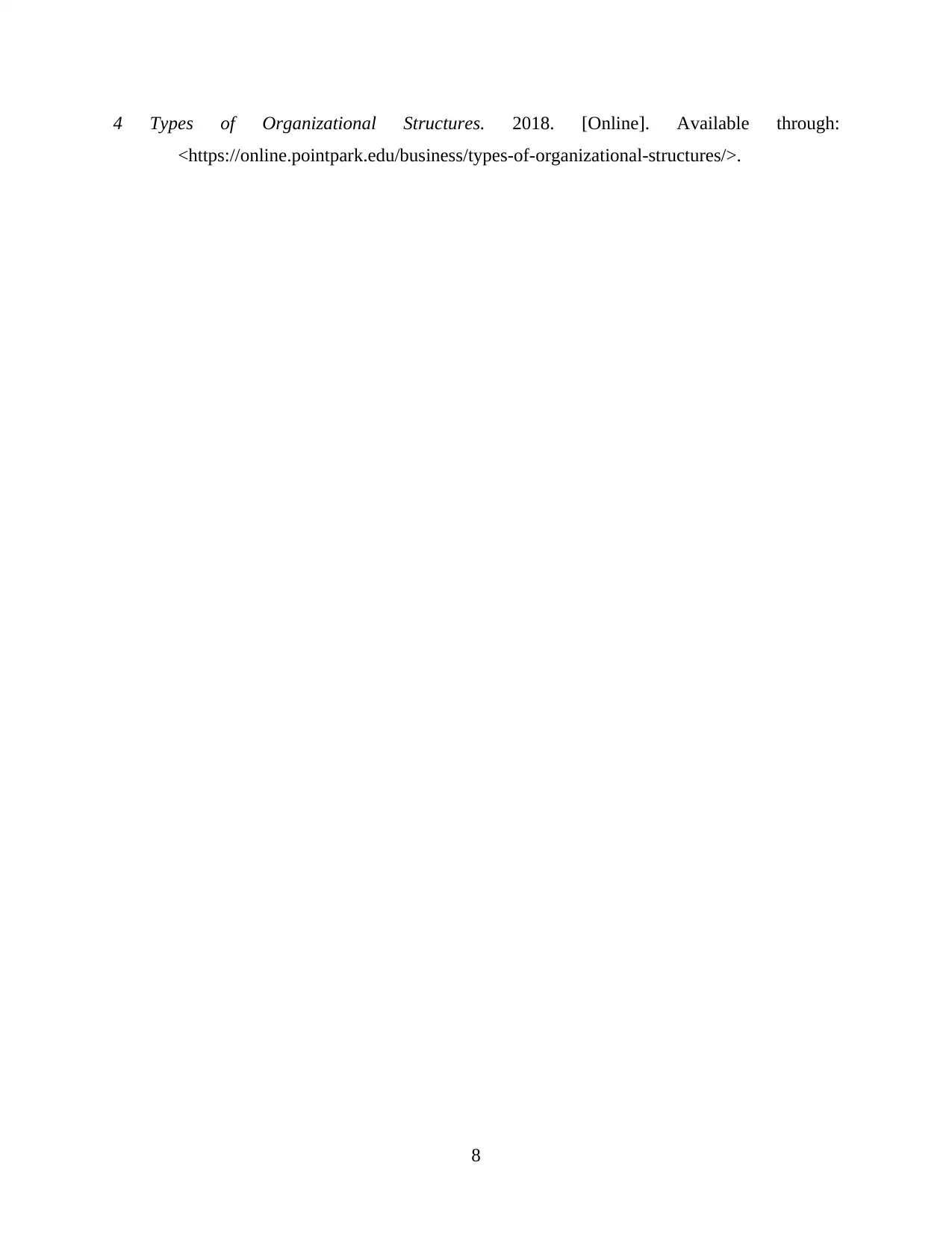
4 Types of Organizational Structures. 2018. [Online]. Available through:
<https://online.pointpark.edu/business/types-of-organizational-structures/>.
8
<https://online.pointpark.edu/business/types-of-organizational-structures/>.
8
1 out of 10
Related Documents
Your All-in-One AI-Powered Toolkit for Academic Success.
+13062052269
info@desklib.com
Available 24*7 on WhatsApp / Email
![[object Object]](/_next/static/media/star-bottom.7253800d.svg)
Unlock your academic potential
Copyright © 2020–2025 A2Z Services. All Rights Reserved. Developed and managed by ZUCOL.





